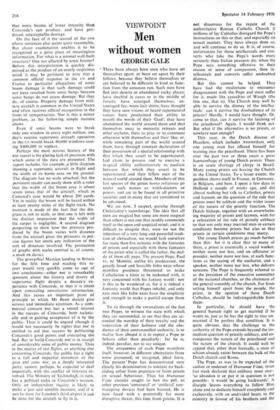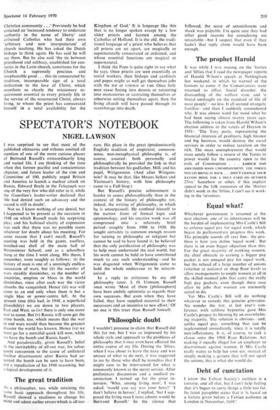VIEWPOINT
Men without women
GEORGE GALE
• There have always been men who have set themselves apart, or been set apart by their fellows, because they believe themselves or are believed to be different in kind or func- tion from the common run. Such men have fled into deserts or abandoned rocky places; have dwelled in caves or in the middle of forests; have scourged themselves, en- couraged lice, worn hair shirts; have thought they have seen visions or heard supernatural voices; have proclaimed their ability to mouth the words of their 'God'; they have abandoned the world around them and shut themselves away in monastic retreats and
other asylums, there to pray or to commune otherwise with themselves and their like; or, while remaining part of the world around them, have, through constant declaration of their possession of a special relationship with that which they assert to be supernatural, laid claim to possess and to exercise a magical ability authoritatively to mediate between that whiCh they assert to be supernatural and their fellow men of the natural world around them. Members of this last species of the genus homo religiosus go under such names as witch-doctors or priests, and are to be found in all primitive societies and in many that are considered to be advanced.
We are now, I suspect, passing through Christianity's sacerdotage. The idea that all men are magical but some are more magical than others is not one that readily commends itself to the open and sceptical mind; and it is difficult to imagine that, were we not the inheritors of a very long and powerful tradi- tion of clericalism, we would fash ourselves for more than five minutes with the fantasies of priests and especially with those fantasies of the priest who is called the father, the dad- dy of them all, papa. The present Pope, Paul vi, ne Montini, unlike his predecessor, the greatly loved and loveable John xxin whose manifest goodness threatened to make Catholicism a force to be reckoned with, is very concerned with his fantasy world: nor is this to be wondered at, for it is indeed a fantastic world that Popes inhabit, and only rare men like John vciii have the simplicity and strength to make a partial escape from it.
To sit through the coronations of the last two Popes, to witness the state with which they are surrounded, to see that they are ac- corded the worship of their royalty and the veneration of their holiness and the obe- dience of their untrammelled authority, is to realise how absurd it is to expect a Pope to behave other than peculiarly: for he is, indeed, peculiar, not to say unique.
The uniqueness of each Pope manifests
itself, however, in different aberrations from some presumed, or imagined, ideal form. The present' Pope has demonstrated very clearly his detemination to tolerate no back- sliding either from populace or from priests on sexual behaviour. Thus his Humanae Vitae circular sought to ban the pill, as other previous 'unnatural' or 'artificial' con- traceptive devices had been banned. He is now faced with a potentially far more disruptive threat, this time from priests. It is
not disastrous for the repute of the authoritative Roman Catholic Church if millions of lay Catholics disregard the Pope's instructions on this or that, and especially on sexual matters. They have always done so, and will continue to do so. It is, of course, unfortunate for those intellectuals and con- verts who take the Pope's words more seriously than Italian peasants do; when the Pope says something offensive to their reason or sense of compassion, then in- tellectuals and converts suffer undoubted distress.
But this cannot be helped. They have had the misfortune to encounter disagreement with the Pope and must suffer for it, much like casualties of Waugh (the late one, that is). The Church may well be able to survive the dismay of the intellec- tuals: can it survive the disobedience of its priests? Hardly, I would have thought. Or, come to that, can it survive the laicising of the priesthood? Again, I would think not. But what if the alternative is no priests, or nowhere near enough?
This year, in the Dutch diocese of Haarlem, which includes Amsterdam, only one young man has offered himself for training into the priesthood. There has been over the past two or three years a great haemorrhage of young Dutch priests. There is an acute shortage of clergy in Brazil. Many young priests are leaving the Church in the United States. To a lesser extent, the problem shows itself in France, in Germany, in Belgium, and here. I spent a few days in Holland a couple of weeks ago, and did almost nothing but talk to Catholics, priests and laymen, on the question of the rule that priests must be celibate and the wider issues of the nature of the priestly function. The Dutch bishops, together with an overwhelm- ing majority of priests and laymen, wish for a relaxation of the rule of priestly celibacy so that not only may married men in certain conditions become priests but also so that priests in certain conditions may marry.
The young Dutch priests go much further than this: for it is clear that to many of them, a priest is essentially a social worker, neither more nor less, and an officiator or presider, neither more nor less, at such func- tions as the saying of the eucharist, and a speaker, neither more nor less, who delivers sermons. The Pope is frequently referred to as the president of the executive committee of the national churches, or the chairman of the general assembly of the church. Far from setting himself apart from the people, the priest, in the opinion of these Dutch Catholics, should be indistinguishable from them.
In particular, he should have the general human right to get married if he wants to, just as he has the right to stay un- married if he prefers that condition. It is quite obvious that the challenge to the authority of the Pope extends beyond the im- mediate question of priestly celibacy, and en- compasses the nature of the priesthood and the nature of the church. It could well be argued that, other than formally, a.state of schism already exists between the bulk of the Dutch church and Rome.
The Pope, as was to- be expected of the
author or endorser of Humanae Vitae, twice last week declared that celibacy must stay:
'to abandon it or put it in question is not possible: it would be going backwards'. A disciple 'leaves everything to follow Him
alone and to dedicate himself completely and exclusively, with an undivided heart, to the ministry in favour of his brothers and the Christian community ...' Previously he had criticised an 'increased tendency to underrate authority in the name of liberty' and criticised Catholics who had their own 'arbitrary and - new interpretation' of church teaching. He has asked the Dutch bishops to think again. He has said he will see them. But he also said 'the tie between priesthood and celibacy, established for cen- turies in the Latin church, constitutes for the Church a supremely precious and irreplaceable good ... this tie consecrated by tradition, incomparable sign of a total dedication to the love of Christ, which manifests so clearly the missionary re- quirement essential to every priestly life in the service of the resurrected Christ, always living, to whom the priest has consecrated himself in a total availability for the
Kingdom of God.' It is language like this that is no longer spoken except by a few older priests and laymen among the Catholics of Holland. It is the old, the tradi- tional language of a priest who believes that all priests are set apart, are magically or supernaturally consecrated or ordained, and whose essential functions are magical or supernatural
I think the Pope is quite right to say what he says. Once priests are seen essentially as social workers, then bishops and cardinals and popes might as well get themselves jobs with the ILO or UNESCO or FAO. Once holy men cease fleeing into deserts or retreating into monasteries or castrating themselves or otherwise setting themselves apart, then the living church will have passed through its sacerdotage into death.



































 Previous page
Previous page